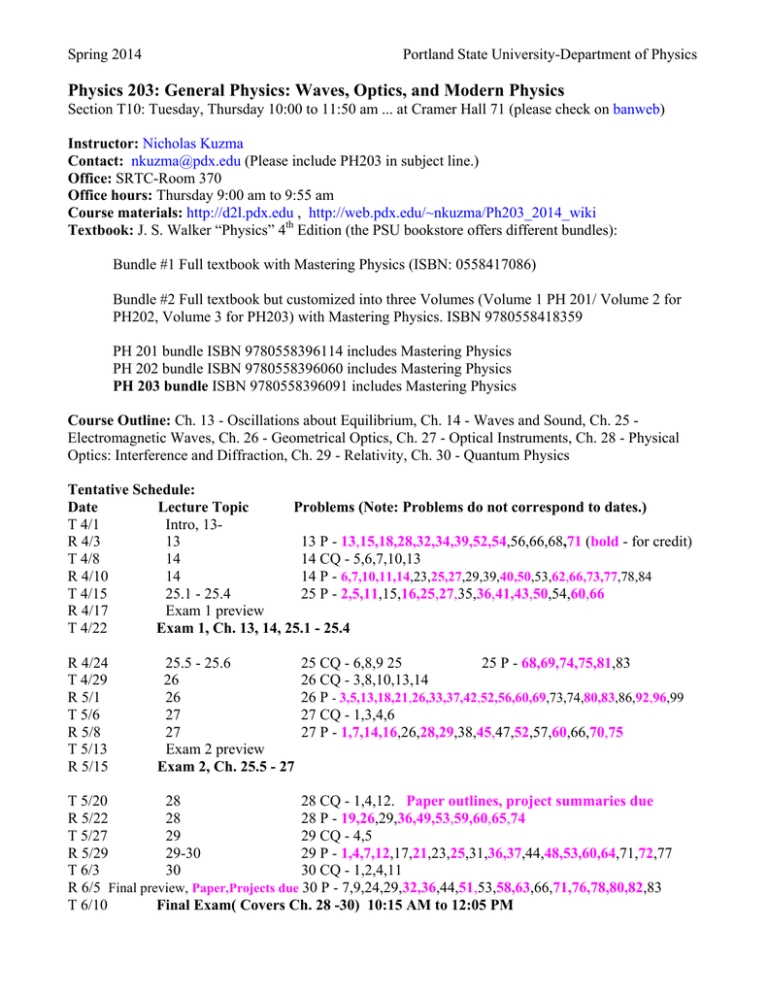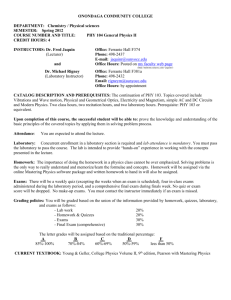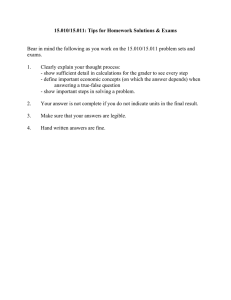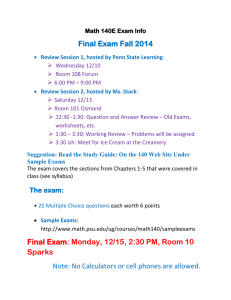Portland State University
advertisement

Spring 2014 Portland State University-Department of Physics Physics 203: General Physics: Waves, Optics, and Modern Physics Section T10: Tuesday, Thursday 10:00 to 11:50 am ... at Cramer Hall 71 (please check on banweb) Instructor: Nicholas Kuzma Contact: nkuzma@pdx.edu (Please include PH203 in subject line.) Office: SRTC-Room 370 Office hours: Thursday 9:00 am to 9:55 am Course materials: http://d2l.pdx.edu , http://web.pdx.edu/~nkuzma/Ph203_2014_wiki Textbook: J. S. Walker “Physics” 4th Edition (the PSU bookstore offers different bundles): Bundle #1 Full textbook with Mastering Physics (ISBN: 0558417086) Bundle #2 Full textbook but customized into three Volumes (Volume 1 PH 201/ Volume 2 for PH202, Volume 3 for PH203) with Mastering Physics. ISBN 9780558418359 PH 201 bundle ISBN 9780558396114 includes Mastering Physics PH 202 bundle ISBN 9780558396060 includes Mastering Physics PH 203 bundle ISBN 9780558396091 includes Mastering Physics Course Outline: Ch. 13 - Oscillations about Equilibrium, Ch. 14 - Waves and Sound, Ch. 25 Electromagnetic Waves, Ch. 26 - Geometrical Optics, Ch. 27 - Optical Instruments, Ch. 28 - Physical Optics: Interference and Diffraction, Ch. 29 - Relativity, Ch. 30 - Quantum Physics Tentative Schedule: Date Lecture Topic Problems (Note: Problems do not correspond to dates.) T 4/1 Intro, 13R 4/3 13 13 P - 13,15,18,28,32,34,39,52,54,56,66,68,71 (bold - for credit) T 4/8 14 14 CQ - 5,6,7,10,13 R 4/10 14 14 P - 6,7,10,11,14,23,25,27,29,39,40,50,53,62,66,73,77,78,84 T 4/15 25.1 - 25.4 25 P - 2,5,11,15,16,25,27,35,36,41,43,50,54,60,66 R 4/17 Exam 1 preview T 4/22 Exam 1, Ch. 13, 14, 25.1 - 25.4 R 4/24 T 4/29 R 5/1 T 5/6 R 5/8 T 5/13 R 5/15 25.5 - 25.6 26 26 27 27 Exam 2 preview Exam 2, Ch. 25.5 - 27 25 CQ - 6,8,9 25 25 P - 68,69,74,75,81,83 26 CQ - 3,8,10,13,14 26 P - 3,5,13,18,21,26,33,37,42,52,56,60,69,73,74,80,83,86,92,96,99 27 CQ - 1,3,4,6 27 P - 1,7,14,16,26,28,29,38,45,47,52,57,60,66,70,75 T 5/20 28 28 CQ - 1,4,12. Paper outlines, project summaries due R 5/22 28 28 P - 19,26,29,36,49,53,59,60,65,74 T 5/27 29 29 CQ - 4,5 R 5/29 29-30 29 P - 1,4,7,12,17,21,23,25,31,36,37,44,48,53,60,64,71,72,77 T 6/3 30 30 CQ - 1,2,4,11 R 6/5 Final preview, Paper,Projects due 30 P - 7,9,24,29,32,36,44,51,53,58,63,66,71,76,78,80,82,83 T 6/10 Final Exam( Covers Ch. 28 -30) 10:15 AM to 12:05 PM Homework: The homework problems are listed above and most solutions are posted on D2L. Doing the homework should help you to review the material and prepare for the exams. Keeping up with the homework is highly recommended for doing well in this class. Here are two options for the suggested homework problems: 1. Opt to not turn in any homework problems. In which case your grade will be calculated based on the three exam scores and any additional credit received. 2. Turn in the homework problems through Mastering Physics, http://www.masteringphysics.com Homework grades greater that 80% will receive a homework grade of 100% with lower scores scaled accordingly (by adding 20%). Your grade will then be calculated based on 80% for exams, 20% for your homework score, plus the additional credit (see below). Course ID: PH203KUZMASPRING2014 The assignments labeled “Homework” on Mastering Physics will be graded. The assignments labeled “Exercises” are just as important but are not graded. The “Practice Material” contains all problems that are available on Mastering Physics and is for those of you who want additional material to work on. Exams: The exams will have both conceptual questions and problems: multiple-choice questions (Scantron Required) and 4 show-your-work problems (partial credit will be given and you will only be required to answer 3 of your choosing). The exams are not comprehensive, but exam 2 and the final exam may include general concepts already covered in previous exams. Your three exam grades will be weighted as follows: 20% (worst exam grade), 35% (middle exam grade), 45% (best exam grade) You will need a calculator and you can bring one double-sided piece of paper (8.5’’ x 11’’) with handwritten notes. Use of cell phones / computers (other than a calculator) / texting devices, during exams is strictly prohibited, and will not be tolerated. For a low scoring exam a curve may be applied. Missed Exam Policy: You are required to take all three exams, missing an exam will result in a zero for that exam (preventing any possibility for an A or B+ in the class). To be excused from an exam you must e-mail me in the beginning of the term explaining the scheduling conflict (job-related or family-related). In case of an illness I expect a doctor’s note to excuse the absence. If you miss two of the exams, you will be given a grade of “F” for the course. I do not generally give make-up exams. Grading: Grades will be determined using the following scale: 90% or better is an A-/A 80% to 89.99% is a B-/B/B+ 70% to 79.99% is a C-/C/C+ 60% to 69.99% is a D Intra-grade boundaries will be 95% (for A), 86.67% (for B+), 83.33% (for B), 76.67% (for C+), etc. I will calculate your grade with both options of turning in homework or not and choose the better of the two grades. Additional credit (will be capped at 15 points maximum for all the items below): 1. Quizzes: (maximum of 5 points additional credit) There will be five short in-class multiple choice quizzes throughout the term and a survey. You will receive a point for each correctly answered quiz (0.2 points for incorrect submission), up to 5 points total quiz credit. 2. Workshop or Term paper (5 points additional credit, choose one of the two options) a. Workshop Complete the class “Workshop for Ph201” successfully. The workshops meet weekly for 1h50min sessions. It is a one credit class and you need to sign-up for it. To pass the workshop, students must attend all workshops and participate actively. You will work under the guidance of a workshop leader in small groups on problems sets corresponding to the material of the general physics lecture. Information on the Workshop can be found here: http://www.physics.pdx.edu/~ralfw/physics/Workshop/index.html b. Term paper Write a term paper based on a calculation that yields a numerical answer. Some possible topics are listed below, but you are free to choose another subject that relates the physics discussed in class and that sparks your interest. You need to email me an outline of your paper, with a list of references by May 20th. The paper should answer a specific question, be 6-8 pages long (double spaced, font size 12) including figures and references. The paper is due by email on June 5th. I only accept papers of people that have submitted the outline. No late work will be accepted for the outline and the paper submission. The paper should include the title, introduction, main question, calculations, result(s), discussion, and conclusion, followed by references. Place the figures (if any) throughout the text, make sure they are numbered and have captions. Examples of topics for the term paper: How the lengths and the tension of guitar strings are set up to accomodate the musical scale? What is the optimal frequency for prenatal ultrasound? How to design a Fresnel lense? What determines the design parameters of an intercontinental fiber optics cable? What limits the resolution of microscopes (optical, electron)? What determines the accuracy of measuring the speed of light? What was the early experimental evidence for quantum mechanics? What is the consequence of the Heisenberg uncertainty principle for quantum computation? Are there extra dimensions? What is the latest evidence for the Higgs boson? 3. Computational Project (5 points additional credit, sign up on the class wiki, under Projects, by Apr 17th). A number of computational projects will be available to those with access to data-processing software [R, Igor Pro, Mathematica, MatLab, Microsoft Excel, or any other capable of performing operations on arrays (columns) of data]. The main results summaries are due by email by May 20th. The final write up must include the title, introduction, summary of the input data (if any), main purpose of the computation, figures showing the results (with axes lables and units), figure captions, results and discussion, references (if any), and the appendix with the code print-out (or the excel spreadsheet attached). The final write-up must be emailed to the instructor by June 5th. 4. Class wiki edits and/or other course improvement contributions (up to 5 points additional credit) Register at our class wiki http://web.pdx.edu/~nkuzma/Ph203_2014_wiki by clicking "Register" in the upper-right corner. Contribute by logging in (upper right corner) and clicking "Edit" next to the relevant section. Please keep a diary of your edits (date/section/brief summary) to ensure proper credit later. PSU Tutoring Services: The skills enhancement and Tutoring Center offers physics tutoring sessions: Second floor of the University Library, (503) 725-4448, web: http://www.pdx.edu/tutoring/ General Physics lab: You are required to concurrently (or previously have taken) the general physics lab. Experimentation in physics (and science in general) is critical to understanding. web: http://www.physics.pdx.edu/~ralfw/physics/lab/index.htm Academic Misconduct: Academic dishonesty is the act of knowingly or intentionally seeking to claim credit for the work or effort of another person or participation in such acts. This includes, but is not limited to: (a) cheating, (b) fraud, (c) plagiarism, such as word for word copying, using borrowed words or phrases from original text into new patterns without attribution, or paraphrasing another writer's ideas; (d) The buying or selling of all or any portion of course assignments and research papers; (e) Performing academic assignments (including tests and examinations) for other persons; (f) Unauthorized disclosure or receipt of academic information; (g) Falsification of research data; and (h) Unauthorized collaboration. Adapted from: PSU Student Code of Conduct (http://www.pdx.edu/dos/codeofconduct) Cheating during an exam will result in a zero grade in the course and referral to the office of student affairs. A no tolerance policy will be enforced.


